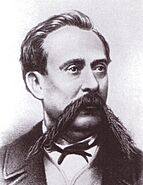Nikolay Zinin facts for kids
Quick facts for kids
Nikolay Nikolaevich Zinin
|
|
|---|---|

Nikolay Zinin
|
|
| Born | 25 August 1812 Shusha, Elizavetpol Governorate, Russian Empire
|
| Died | 18 February 1880 (aged 67) Saint Petersburg, Russian Empire
|
| Nationality | Russian |
| Alma mater | University of Kazan |
| Scientific career | |
| Institutions | University of Kazan University of Saint Petersburg |
| Doctoral advisor | Justus Liebig |
| Doctoral students | Alexander Borodin Aleksandr Butlerov |
Nikolay Nikolaevich Zinin (Russian: Никола́й Никола́евич Зи́нин; August 25, 1812 – February 18, 1880) was a very important Russian organic chemist. He made big discoveries in how to create new chemical compounds. Zinin is especially famous for a special chemical reaction that helps change one type of chemical into another.
Contents
Zinin's Life and Learning
Nikolay Zinin was born in a place called Shusha. His father worked there as a diplomat. Sadly, Nikolay became an orphan when he was young. His parents and sister passed away during a cholera sickness.
He went to the University of Kazan to study. He first graduated in mathematics. But by 1835, he started teaching chemistry. To become even better at chemistry, he traveled to Europe. He studied there from 1838 to 1841.
Studying with a Famous Chemist
While in Europe, Nikolay Zinin studied with a very famous chemist named Justus Liebig in Giessen. There, Zinin worked on a chemical process called the benzoin condensation. Liebig had found this process a few years earlier. Zinin presented his research at the University of Saint Petersburg. He earned his Ph.D. (a high university degree) there.
In the same year, he became a Chemistry Professor at the University of Kazan. Later, in 1847, he moved to the University of Saint Petersburg. He also became a member of the important St. Petersburg Academy of Sciences. From 1868 to 1877, he was the first president of the Russian Physical and Chemical Society.
Teaching Alfred Nobel
When he was in Saint Petersburg, Professor Zinin also taught chemistry privately to a young man named Alfred Nobel. Alfred Nobel later became famous for inventing dynamite and for creating the Nobel Prizes.
Zinin's Important Discoveries
Nikolay Zinin is well-known for a special chemical process. It is often called the Zinin reaction or Zinin reduction. This reaction helps change certain chemicals called nitro aromates into amines.
The Zinin Reaction
Imagine you have a chemical like nitrobenzene. Using the Zinin reaction, Zinin found a way to turn it into an amine. He did this by using ammonium sulfides. This was a very important discovery. It helped chemists create many new useful substances.
Identifying Aniline
In 1842, Zinin also played a key role in identifying a chemical called aniline. Aniline is a very important chemical. It is used to make dyes, medicines, and other products.
 | William M. Jackson |
 | Juan E. Gilbert |
 | Neil deGrasse Tyson |

